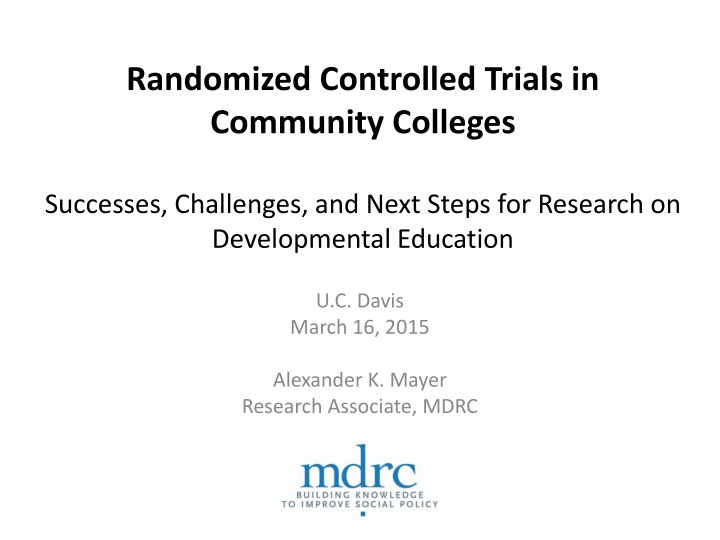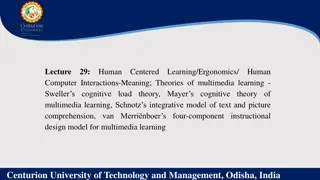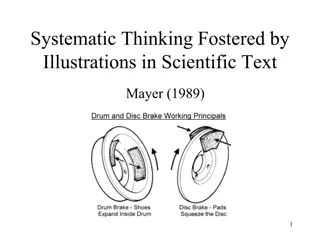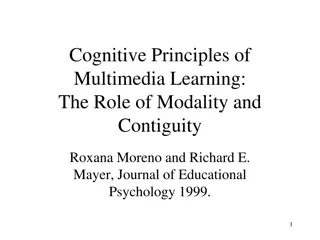
Successes and Challenges of Randomized Controlled Trials in Community Colleges
Explore the successes, challenges, and next steps in research on developmental education in community colleges. The overview of four projects and the impact of learning communities like Kingsborough are discussed, along with early and long-term results. This comprehensive look sheds light on the evolving landscape of developmental education.
Download Presentation

Please find below an Image/Link to download the presentation.
The content on the website is provided AS IS for your information and personal use only. It may not be sold, licensed, or shared on other websites without obtaining consent from the author. If you encounter any issues during the download, it is possible that the publisher has removed the file from their server.
You are allowed to download the files provided on this website for personal or commercial use, subject to the condition that they are used lawfully. All files are the property of their respective owners.
The content on the website is provided AS IS for your information and personal use only. It may not be sold, licensed, or shared on other websites without obtaining consent from the author.
E N D
Presentation Transcript
Randomized Controlled Trials in Community Colleges Successes, Challenges, and Next Steps for Research on Developmental Education U.C. Davis March 16, 2015 Alexander K. Mayer Research Associate, MDRC
Developmental Education Community College Students Majority enters college under-prepared Financial need About 2/3 do not earn a degree or certificate within 6 years Lots of reform Limited systematic research Status quo is changing implications for research 2
Overview of Four Projects Learning Communities Early evaluation and multi-site demonstration Performance-based scholarships Early evaluation and multi-site demonstration Comprehensive program ASAP National center to study developmental education 3 large studies and supplemental studies 3
Kingsborough: Opening Doors Learning Communities Design one semester: Co-enrollment Instructor collaboration Curricular integration Additional supports (counseling, tutoring, textbooks) Theory of change Greater Engagement Stronger relationships Benefits of extra support 5
Early Results Kingsborough Learning Communities Strong implementation Support from college administration Students felt more integrated Impacts during the program term Students attempted and passed more courses Earned more credits (about 1.2 credits) Advanced more quickly through developmental education Impacts after 4 semesters No impact on persistence Earned more credits (about 2.4 credits) 6
Long-term Results Long-term follow-up at Kingsborough 60 4.0* 3.7* 56.3 52.8 50 52.3 3.4* 49.0 48.1 2.6* Cumulative credits earned 44.8 40 42.0 39.4 2.8** 33.9 30 31.1 2.1*** 20 20.3 18.2 10 0 Year 1 Year 2 Year 3 Year 4 Year 5 Year 6 Program group Control group 7
Learning Communities Demonstration Queensborough Community College: Linked developmental math with a college- level course Merced College: Linked developmental English and a variety of courses Kingsborough Community College: Developmental only Community College of Baltimore County: Linked developmental English, a college-level course, and seminar Hillsborough Community College: Linked developmental reading with a student success course Houston Community College: Linked developmental math with a student success course 8
Results Learning Communities Demonstration 18 0.5 16 Cumulative Credits Earned 15.6 15.1 14 0.6* 12 11.9 11.4 10 Program Group Control Group 0.5*** 8 6 6.9 6.4 4 2 0 Semester 1 Semester 2 Semester 3 8 9
Taking Stock: Learning Communities Variation in the programs across the demonstration Curricular integration was inconsistent Some scaling challenges, especially in first two semesters Modest impacts in the short-term on average Can improve longer-term outcomes Unanswered questions No clear explanation for better results at Kingsborough Impact of ideal program vs. as implemented? 10
Louisiana Results Performance-Based Scholarships Performance-Based Scholarships: Need-based grants Contingent on academic performance and/or student services Paid directly to students Paid in addition to other financial aid, such as Pell Goals Address unmet financial need and make college more affordable Improve student success 12
Louisiana: Opening Doors Performance-Based Scholarships Student participants Most were women who were single parents $1,000/semester if enrolled half-time and earned a C average Control group Less than 40% registered in 2nd and 3rd semesters After 3 semesters, average of 7.7 earned credits Impacts Positively affected persistence in 2nd and 3rd semesters Earned more credits (3.3 credits) 13
Performance-Based Scholarship Programs Parents: Lorain County, Owens, and Sinclair Community Colleges (OH) High school seniors: California Cash for College (CA) Adult learners: Borough of Manhattan and Hostos Community Colleges (NY) Developmental math sequence: Hillsborough Community College (FL) Hispanic males: Pima Community College (AZ) Parents: Delgado Community College and Louisiana Technical College (Opening Doors Demonstration) Traditional college students: University of New Mexico (NM) 14
Early Results Performance-Based Scholarships 30 Program Group Control Group 0.9 25 25.7 24.8 20 1.7 *** 1.7 ** 0.9 * 1.0 15 16.3 16.1 15.6 15.5 14.9 3.3 *** 14.3 13.9 13.9 10 11.0 7.7 5 0 Opening Doors Louisiana Arizona Florida New Mexico New York Ohio 15 15
Taking Stock: Performance-Based Scholarships Programs adhered to core principles Flexibility to tailor programs to specific student needs Modest but consistent impacts in the longer-term Including on degrees, and in some cases loans No effect on persistence Little detectable variation in impacts Implications and unanswered questions Impacts on policy Scholarship size Services vs. no services 16
Comprehensive Reform Accelerated Study in Associate Programs
Accelerated Study in Associate Programs (ASAP) Financial Supports Tuition Waiver MetroCards Textbooks Student Responsibility Enroll Full-time Take Dev. Ed. Early Graduate in 3 Years Course Enrollment ASAP Seminar Block-Schedule Early Registration Student Services Advising Tutoring Career Services 18
Accelerated Study in Associates Program ASAP 3-year Results Program Group Control Group Difference 40% 22% 18 Graduation rates nearly doubled 19
ASAP: Next Steps ASAP Replication Replication of ASAP in 3 Ohio colleges MDRC & CUNY exploring opportunities to bring ASAP to other communities Long-term follow-up 20
Center for the Analysis of Postsecondary Readiness MDRC, CCRC, and additional partners Descriptive study of developmental education Large national survey and qualitative interviews Assessment study RCT of new algorithms in colleges across New York Instruction study RCT of the New Mathways Project in colleges across Texas 21
Contact Information Alex Mayer Research Associate Alexander.Mayer@mdrc.org Reports available at www.mdrc.org 22





